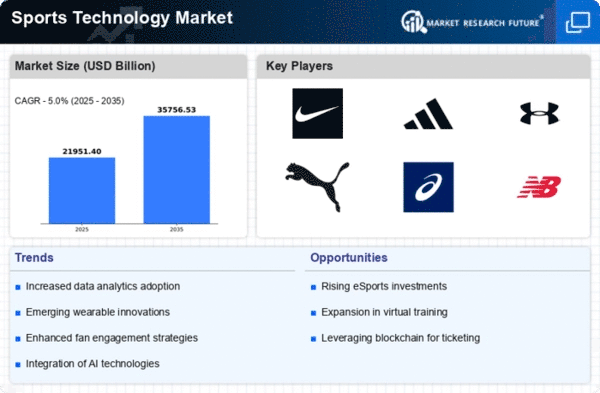Market Analysis
In-depth Analysis of Sports Technology Market Industry Landscape
The Sports Technology market is currently witnessing dynamic changes, driven by a convergence of technological advancements, changing consumer behaviors, and a growing emphasis on data-driven insights in sports. One of the primary drivers shaping the market dynamics is the increasing integration of wearables and smart devices in sports. Athletes and fitness enthusiasts are adopting wearable technologies, such as fitness trackers and smartwatches, to monitor their performance, track health metrics, and enhance training routines. This trend has created a substantial market for sports technology companies, leading to the development of innovative solutions that cater to the evolving needs of both professional athletes and fitness enthusiasts.
The rise of data analytics and artificial intelligence (AI) is another key factor influencing the market dynamics of sports technology. Teams, coaches, and sports organizations are leveraging data analytics to gain deeper insights into player performance, injury prevention, and strategic decision-making. AI-powered technologies analyze vast amounts of data, providing valuable insights that can shape training programs, optimize game strategies, and contribute to overall performance improvement. As a result, the demand for sports analytics solutions continues to grow, influencing the competitive landscape of the sports technology market.
The fan experience has also become a focal point in shaping market dynamics. Sports technology is increasingly being used to enhance the spectator experience, both in stadiums and through digital platforms. Virtual and augmented reality technologies offer immersive experiences for fans, allowing them to feel more connected to the game. From virtual stadium tours to augmented reality overlays during live broadcasts, sports technology is transforming how fans engage with and consume sports content.
Furthermore, the global shift towards remote and online sports participation has led to the emergence of new market dynamics. With the rise of esports, virtual competitions, and online fitness platforms, sports technology is extending its reach beyond traditional physical sports. The integration of technology in these digital sports experiences is creating new opportunities for companies to provide innovative solutions for training, competition, and fan engagement in the virtual realm.
Innovation and collaboration within the sports technology ecosystem are crucial factors driving market dynamics. Companies are actively engaging in partnerships, mergers, and acquisitions to expand their portfolios and capabilities. Startups are playing a significant role in introducing disruptive technologies, while established players are investing in research and development to stay ahead in the rapidly evolving landscape. The intellectual property landscape is also shaping competitive dynamics, with companies seeking to secure patents for their technological innovations.
Regional dynamics play a role in the sports technology market, with variations in the adoption of technology and sports culture influencing market trends. Different countries have diverse preferences when it comes to sports, and the level of technological integration may vary based on factors such as infrastructure, economic conditions, and regulatory frameworks.

















Leave a Comment